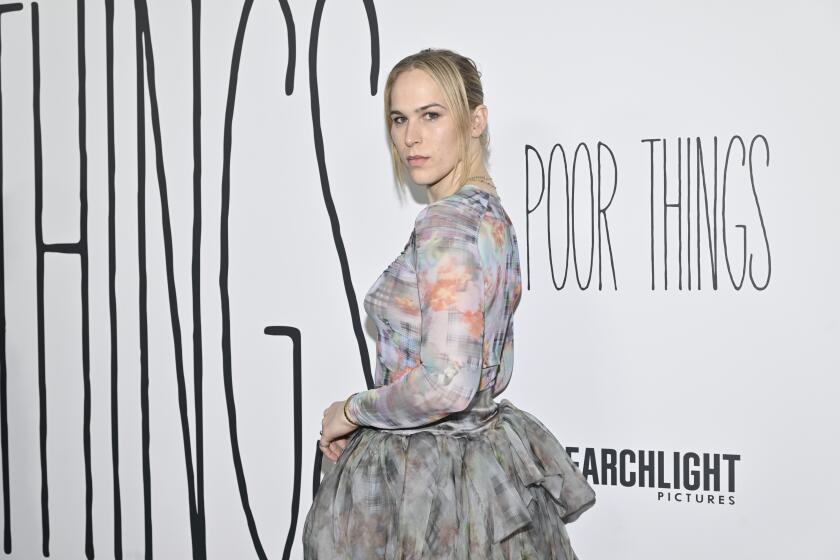Calendar Letters: Not P.C., but it’s still art
Regarding “Frankly, My Dear, You’re Racist” [Sept. 6]: Censoring or even destroying art that is no longer politically correct is itself a crime against humanity. England lost over half its art during the Reformation. Everything from statues to tombs were destroyed because people were offended by art. In France, iconoclasts wanted to tear down Chartres, one of the greatest of the Gothic cathedrals.
We would have to ban every movie made by Frank Capra, since there was always the Irish American cop, the Italian American bartender and the African American maid. Almost every film more than a few years old would have to go as well. For instance, “Casablanca,” where Dooley Wilson’s African American piano player calls Humphrey Bogart’s character Mr. Rick, while he is Sam.
If Scarlett and Rhett are banned, a lot more will be “Gone With the Wind.”
David Goodwin
Los Angeles
::
I was afraid “Gone With the Wind” would be thrown onto the heap of Confederate statues. Instead, one should applaud Hattie McDaniel’s character, Mammy. This African American woman had the strength to run Tara like a CEO, while the likes of Scarlett and others in their frills were the Kardashians of the era, mindless and selfish.
Christine Peterson
Woodland Hills
::
I consider “Gone With the Wind” one of the finest films made. Its presentation of the happy slaves is consistent with the novel. I certainly do not favor deleting films because they make some people uncomfortable; rather, they should be shown as double features with more accurate versions of the period, such as “12 Years a Slave.”
Only by viewing movies in a broader context can we understand the intent of the producers and directors and that they were in a certain time and place that must be analyzed.
Marc González
La Crescenta
::
“Gone With The Wind” runs just short of four hours. I can’t imagine an audience leaping at the chance to linger and listen to a post-show discussion for any reason, including the supplying of social/historical context. Every work of art, film included, is a product of its own time and culture and to a greater or lesser degree embodies a context that will be different from a movie that opened last week.
Preston Neal Jones
Hollywood
A landfall on ‘60 Minutes’
Regarding “Irma Rains on Bannon Parade” [Sept. 11]: I was not a fan of Steve Bannon’s style — until Sunday night on “60 Minutes.” He made toast of interviewer Charlie Rose.
Linda J. Bowling
Studio City
::
Since you gave a paragraph to Bannon’s physical appearance, I thought it would be only fair of you to spend the same time on the appearance of a baggy-eyed, weary Rose. Beauty is definitely in the eyes of the beholder.
Robert Flaxman
Beverly Hills
::
Excellent article about Bannon’s “60 Minutes” interview.
Ross Gentry
Santa Monica
::
It might be said that the media’s desperate attempt to gin up viable breaking news around what turned out to be the non-news event of Hurricane Irma’s landfall in the U.S. could only be equaled by Rose’s desperate attempt to inject spectacular denouement into his largely failed takedown of Bannon. Neither event, in any case, was worthy of one’s missing even the most humble of local car chases. In retrospect, it’s a shame local news coverage was preempted in favor of the breathlessly reported “news” of a nonfunctioning traffic light in Miami or a pair of limp palms in Tampa. As my mother might have said, a veritable tempest in a teacup.
Jeff Denker
Malibu
Dazed, confused over omission
Randall Roberts’ timeline of key musical moments on the Sunset Strip [“Sunset Boulevard: Time Beats On,” Aug. 27] omitted an epic event. On Jan. 2, 1969, Led Zeppelin made its L.A. debut at the Whisky a Go Go. Hard to believe this was almost 50 years ago. The influence of this band reverberates to this day.
Ilene Seigel
Oak Park, Calif.
More to Read
The biggest entertainment stories
Get our big stories about Hollywood, film, television, music, arts, culture and more right in your inbox as soon as they publish.
You may occasionally receive promotional content from the Los Angeles Times.






